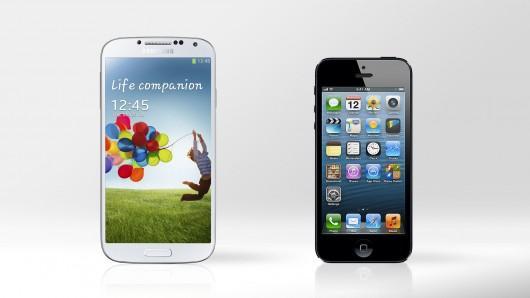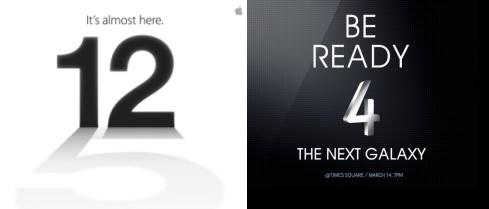
Anybody who is even remotely interested in this industry probably already knows all about the Galaxy S 4. It has gotten nothing but attention for the past week, and now that it's finally here and official it's still claiming headlines right and left (see: the entire front page of PhoneDog.com). Some are negative, some are positive; but one thing you can't deny is how grand of a scale the attention for this device has risen to. The only other device that I can think of that gets this much speculation, coverage, and debate would be the iPhone. From pre-launch advertisements to launch day, it's clear that there are some similarities between the two marketing campaigns. However, there are also some key differences that make Samsung come out ahead.

Already we see some differences in marketing that may have made a difference. We can see that the "5" shadow created by the gigantic "12" on the flyer probably means that the iPhone 5 is coming out, but for somebody just looking at the flyer without having any prior information might get confused and infer that whatever announcement set to take place might occur on December 5th. You don't really know where, or what time; the reader has to dig that information up themselves. The Galaxy S 4 flyer shows you more than enough information; the Samsung event would be at Times Square on March 14 at 7 PM. There is not a whole lot of room for confusion there.
Moving on from the flyer (but borrowing from a previously mentioned idea) I'm going to talk about the event itself. The iPhone 5 event was the first Apple event that I tuned in to in real time, and probably the last one I'll ever actually be excited for unless things change. It was a nightmare trying to find a reliable live stream, and although we had a reliable live blog here at PhoneDog I'm actually better at listening and dictating my notes. Unfortunately, I spent about half an hour unsuccessfully finding an official live stream (I didn't realize they didn't have one) which was frustrating. My thought at the time was something like, "Do you want people to know about your device or don't you?" I guess they don't; I don't know. But then you look at Samsung who made the entire event open to the world whether you were there or not, and it was actually quite enjoyable.
As for the devices themselves (which is probably the most important aspect here) it's evident that Samsung made the Galaxy S 4 to look strikingly similar to the Galaxy S III. I'm sure all of us can recall another company that did the same thing, but got more grief for it. When Apple made the iPhone 3GS and the iPhone 4S, everybody played the "fool me once, shame on you; fool me twice, shame on me" game, yet the accusations are surprisingly minimal in the case with the Galaxy S 4 - unless you're Contributing Editor Chase Bonar. What makes the Galaxy S 4, which practically shares the same body as the Galaxy S III, any different than how Apple created their products? I feel like Samsung did do a better job highlighting all if the differences about the two devices. There really were a lot of new features packed into the Galaxy S 4 and I’m hoping side-by-side comparisons of the two devices (the Galaxy S III and the Galaxy S 4 that is) will further prove it.
As for Apple, the only thing the iPhone 4S had to offer apart from the iPhone 4 was Siri, a faster processor, and more memory. That's about it. However, I feel like they did the appropriate thing by not calling the iPhone 4S the "iPhone 5", so for that I'll give them credit.
Did Samsung really "copy" Apple in their marketing campaign? To an extent, I'd say yes. But does everything really have to be so deep? I don't think Samsung copied the idea of carrying almost identical housing to the Galaxy S 4 because Apple did it, I think they did it because it makes sense that they would until this form-factor just doesn't cut it anymore - kind of like how the iPhone 5 turned out. Regardless whether Samsung copied or not, they must have done something right because it caught just about everyone's attention.
Now we wait and see if Apple turns the tables back on Samsung.
Readers, what do you think? Do you think Samsung is benefiting from an improved Apple strategy? Do you think the similarities are being stretched too far? Let me know your thoughts in the comments!
Image via Gizmag